A Pictorial History of the
It is impossible to discuss the history of
The Remnant without tracing the
roots of its founding editor, Walter Matt, who for more than thirty years was an
editor of
The Wanderer and who left that paper in 1967 to found
The Remnant. In a very real sense,
then, the history of
The Remnant starts in 1867, when
the Matt Family’s journalistic legacy began in this country…a legacy which
continues to the present day. Hugo Klapproth
This influence was rooted in the anti-Catholic, Masonic juggernaut that ultimately would help give rise to Hitlerism itself in Germany. These two monks, in trying to counteract this influence, founded a newspaper, Der Wanderer, to help educate German immigrants, not only in their German Catholic heritage, but also in the dangers of Masonry’s anti-Catholic agenda. After two years of editing Der Wanderer, they felt the need to bring in a professional editor so that they might devote themselves totally to their priestly duties. Their choice for a replacement was Hugo Klapproth. Hugo Klapproth was born in Zellerfield, Germany on August 29, 1848. He had emigrated from Germany and settled in Kentucky before moving his family to Wisconsin where he worked as editor of the Milwaukee Germania, a Lutheran daily. For many years he’d been a practicing Lutheran and a respected member of the Missouri Synod Lutheran Church.
However, during the course of his study, which had as its end the refutation of the Catholic priest’s thesis, Klapproth began to realize more and more that Father Janssen was absolutely correct in all of his findings against Luther and that the Lutheran Church was an affront to Christ’s true Church. The result was that Mr. Klapproth announced to his superiors that they would have to find another man for the job of refuting Father Janssen as he had to concur with the priest’s impeccable logic and well-grounded arguments. He also announced that he and his entire family were converting to the Catholic Church. Der Wanderer had thus found its new editor.
After several years of faithful service to Der Wanderer, Mr. Klapproth decided that he needed a younger assistant to keep up with the rapid growth of his weekly newspaper. A young reporter in the East by the name of Joseph Matt was beginning to make a name for himself at the time with outspoken, hard-hitting editorials. Joseph Matt’s strong Catholic approach to the problems of the day drew the attention of Hugo Klapproth. He invited this young reporter to join him at Der Wanderer. The young immigrant accepted the invitation and, in 1897, Joseph Matt came to St. Paul. Thus commenced what would be life-long service to the Catholic Press Apostolate. In 1899, after many years of service, Mr. Klapproth was forced by ill health to return to his beloved Germany, leaving his future son-in-law Joseph Matt behind to take his place as editor. Joseph returned briefly to Germany that same year in order to wed Hugo Klapproth’s daughter, Marie. That union produced six children, the youngest of whom was Walter who was destined to become editor of The Wanderer and founder of The Remnant. Hugo Klapproth died in Lucerne, Switzerland, on September 3,
1919. He related the history of his conversion in a splendid volume titled
Briefe an
einen protestantischen Freund
(Letters to a Protestant Friend)
Joseph Matt, KSG Joseph Matt was born on October 16, 1877 in Kirrweiler, Germany. He came to this country at the age of 17.
His hard-hitting style drew the attention of Hugo Klapproth, the editor of Der Wanderer in St. Paul, Minnesota. When invited by Mr. Klapproth in 1897 to join his staff, he gladly accepted, journeyed to St. Paul and began his long career as a Catholic journalist and editor. After 65 years in harness as editor of the weekly magazine (one of the longest in U.S. history), he was honored by the Catholic Press Association as the Catholic Editor Emeritus in America.
He continued Der Wanderer’s strong stand against the Americanism heresy, and, very early on, saw the dangers of Hitler and National Socialism in Germany. So outspoken was he against Nazism and what he called “its reckless ‘Fuehrer',” that by the late 1930s Der Wanderer became one of the first publications outside Germany to be forbidden in the Hitler Reich and in countries occupied later on—an action which, due to the large number of subscribers in Germany at that time, almost brought about the demise of the paper. During the war years, Der Wanderer had to be translated each week into English and subjected to a State Department screening before it could be mailed. This was due to wrongful slander from some anti-Catholic quarters which suggested that the paper had Nazi sympathies. This accusation, in fact, was repeated by Hollywood movie star and radio personality, Orson Welles, on his national broadcast of the news. Ironically, Welles’ accusation against Der Wanderer was making news about the same time that Joseph Matt’s son, Walter, was receiving the Bronze Star for meritorious service in U.S. Army Intelligence in Europe. News clipping from the St. Paul Pioneer Press
Alphonse Matt, Sr. The Wanderer sued Orson Welles for libel, and Welles would eventually settle out of court as there was no basis in truth to the actor’s bizarre anti-German, anti-Catholic accusations. Joseph Matt’s denunciation of both Nazism and Communism from the perspective of a Catholic historian and American editor was so powerful, in fact, that Der Wanderer brought down the wrath of both the Nazis and the Soviets at the same time. In the January 16th 1964 issue of The Wanderer, Joseph Matt explained how it had been during the war. He wrote: "Then, too, the rise of Hitlerism in Germany and the responsibility of keeping our readers in Germany and Austria as well as in America informed of the dangers inherent in this radical movement and its reckless "Fuehrer" was a further reason to keep our German publications intact for the time being. Hitler and his cohorts were only too well aware of the unyielding opposition of The Wanderer, and, in point of fact, ours was one of the first publications outside Germany to be forbidden in the Hitler Reich and in countries occupied later on. We had at that time about three thousand readers of our annual Wanderer-Kalender [almanac which Joseph Matt had founded in 1902. This loss was, of course, a severe blow to a small business. Nevertheless, even to this day the lie is occasionally circulated that The Wanderer is a "Nazi paper." Several years ago a big radio advertiser [the actor, Orson Welles] had to pay damages for circulating the same lie when we took our case to court. Shortly afterwards, the official Communist Russian organ, Pravda, tried to prevail on our Government to suppress The Wanderer because of its intransigent anti-Communist position, and this, in fact, seems to indicate the chief source of the continuing propaganda against our paper." Over the long history of this extraordinary man’s career, he fearlessly dealt with many controversial issues and won great recognition for his faithfulness to the teachings of the Catholic Church. Here are a few examples:
Joseph Matt receiving Germany’s
He also oversaw a great many charitable efforts for the war orphans and refugees during and after World War II, and was a member of the Building Committee of St. Agnes Church, the historic Baroque German church in St. Paul. As the years passed, Mr. Matt recognized the need to change the German-language Der Wanderer into an English-language newspaper. This he did in 1931, when he anglicized the name to The Wanderer. Although, because of his great love for the German readership that had followed him so loyally for so many years, he continued to publish a German-language insert in The Wanderer for many years thereafter. By the late 1950s, Joseph Matt had come to be regarded as America’s premier Catholic editor.
He used one of his final editorials in The Wanderer to announce his successor—his youngest son, Walter Leo Matt, the then assistant editor of The Wanderer, who after having returned from the war, had helped his father triple the size of The Wanderer’s subscriber base. Joseph chose to make his announcement directly in the columns of The Wanderer so that, as he explained at the time, there would be no question as to his choice of successor. He chose Walter to carry on the Matt Family’s fight for the Church, certain that Walter would do so in the same spirit in which he himself had waged it for almost seven decades. Joseph Matt died in 1966.
Walter L. Matt
In 1964, his father, Joseph Matt, announced in The Wanderer that Walter Matt was to succeed him: In June 1899, I became editor of The Wanderer.... After sixty-six years of uninterrupted service, I decided last summer that the state of my health warranted at least a partial retirement. The question of a successor offered no problem. My three sons have been my loyal co-workers for many years. Walter, my successor as editor, was a part-time worker even as a student at the College of St. Thomas and entered The Wanderer as an editorial assistant after his graduation from St. Thomas in 1938. In the Second World War, he spent almost three years in Palestine, Egypt, North Africa and Italy, where he was awarded the Bronze Star for distinguished service. He is well-informed, has a good knowledge of the German language, and is a conscientious journalist. He is married and the father of six children. In 1965, however, the Second Vatican Council ended and, just as it had begun to spread division throughout the whole world, it successfully divided the Matt family very soon thereafter. Viewing the Council and the prospect of a New Mass as developments which would prove disastrous for the Church, he left The Wanderer in 1967 and immediately founded The Remnant. At that time, he had seven children. Thus was founded what was to become the uncontested flagship of the traditional Catholic movement in the United States. The dispute with his brother, Alphonse Matt, had been one rooted in the radical changes brought on by Vatican II, changes which set brother against brother, parent against child, Catholic journalist against Catholic journalist.
In a letter dated April 27, 1970, von Hildebrand wrote a letter to Walter Matt’s brother, the new editor of The Wanderer, summing up, in effect, the meat of the matter that had separated the two Matt brothers. Von Hildebrand wrote:
I thank you very much for your kind letter. But I believe that there is some misunderstanding. You assume that the new ordo missae and especially the rubrics constitute for me merely a personally painful change by replacing something very beautiful and perfect with something less beautiful and less perfect. But unfortunately it is my conviction that the new ordo missae is the greatest pastoral mistake and that its consequences for the Church may be disastrous. I agree however completely with you that it is a grave problem, whether one should criticize it publicly or only intra muros. Concerning this problem every one must follow his conscience. But I frankly cannot understand that you do not only abstain from a public criticism of the new ordo missae but make the “Wanderer” an instrument for propagating and praising the new ordo. You even suggest in your letter, dear Mr. Matt, that I should join this propaganda. As you say that you agreed with my article in “Triumph” in which I stress that obedience to practical decisions of the Pope does not imply approval of them – it is difficult for me to understand why you expect me to utter a univocal approval of something which seems to be, from the purely religious point of view, a “suicidal” practical decision. I do not believe that a mere loyalty to the present Pope who does not act against those who destroy the Catholic faith daily more and more – like Kueng, Schillebecks, Padovano, Greeley and many others – and who does not use the means by which the Church survived through 2000 years: anathema and excommunication – can preserve Catholic faith untarnished. Dear Mr. Matt, it is painful for me to disagree with you because of my sincere admiration for the “Wanderer” throughout the past years and our warm personal union in Christ. This disagreement, however should in no way affect our friendly relations. Faithfully yours
in Christ
In 1972, his good friend, Father Harry Marchosky, introduced him to a promising young Welsh writer from London by the name of Michael Davies. Those Americans who’ve benefited over the years from the excellent books and articles written by Mr. Davies have Mr. Matt to thank for it, as, in 1972, he introduced American Catholic readers to Mr. Davies through his fledgling Remnant and maintained an alliance with him for the next thirty years.
The archbishop’s name, of course, was Marcel Lefebvre, and Mr. Matt used the occasion to more widely introduce American Catholics to the heroic churchman and his apostolate. He supported Monsignor Lefebvre at a time when it was anything but popular to do so. Thus, the Archbishop’s 1988 episcopal consecrations of four bishops against the Pope’s will were a source of great pain for Mr. Matt. He feared that the consecrations could mark the beginning of the establishment of the petite eglise (the little church existing outside the Roman Catholic Church) and so put distance between himself and Econe (the headquarters of the SSPX in those days). Then came the momentous event that changed everything. On January 18, 1991, Bishop Joseph Ferrario, then Bishop of Honolulu, served a group of traditional Catholics—the so-called “Hawaii Six”—in his diocese with a Formal Canonical Warning, threatening them with excommunication for “formal adherence” to a schismatic sect—namely the SSPX. Very soon thereafter, these traditional Catholics were declared excommunicated: "Whereas you performed," Bishop Ferrario said, "a schismatic act, not only by procuring the services" of Bishop Williamson to perform Confirmations at Our Lady of Fatima Chapel, "but also by that very association with the aforementioned bishop (you) incurred ipso facto the grave censure of excommunication.” The Bishop of Honolulu seemed to be acting in accord with the penalties allowed in Pope John Paul’s motu proprio Ecclesia Dei itself, and so this was destined to become the great test case of the Lefebvre “schism”. But when the “Hawaii Six”—led by the late Patricia Morley—took their case to Rome, they received a favorable ruling from Cardinal Ratzinger himself in a letter written on June 28, 1993, which concluded: "From the examination of the case, conducted on the basis of the Law of the Church, it did not result that the facts referred to in the above-mentioned decree are formal schismatic acts in the strict sense, as they do not constitute the offense of schism; and therefore the Congregation holds that the Decree of May 1, 1991 lacks foundation and hence validity." In other words, the excommunication handed down by Bishop Ferrario to the followers of Archbishop Lefebvre was, in fact, non-existent, and the SSPX was evidently considered by Rome to be neither schismatic nor excommunicated. This entire development was covered in minute detail at the time by Michael Davies in the pages of The Remnant.
While the debate still raged, it became clear that this was, in fact, an in-house dispute between the Vatican and the SSPX, and that Rome, according to Cardinal Ratzinger himself, viewed the SSPX, not as a formally schismatic group (as they clearly recognized the authority of Pope John Paul and prayed for the local ordinaries in the diocese in which they’d set up their chapels), but rather as an “independent” priestly fraternity that, because of a theological dispute over the revolutionary nature of the changes brought on by Vatican II, was operating under an “irregular status” vis-à-vis the Vatican. Traditionalists owe Cardinal Ratzinger a great debt of gratitude for ending a “schism” that threatened to run right down the middle of the worldwide traditionalist movement; and The Remnant thanked the Cardinal at the time for setting the record straight.
Since that time, The Remnant has worked to encourage all traditional Catholics—both "approved" and "unapproved"—to work as the “loyal resistance”—that is, loyal to Peter but in adamant resistance to the revolution of Vatican II. Over the years, Walter Matt’s Remnant collaborated with and supported such notable organizations and individuals as Hamish Fraser, Dietrich von Hildebrand, the priestly Fraternity of St. Peter, Bishops Williamson and Fellay, as well as many priests of the SSPX, the Institute of Christ the King, Solange Hertz, Father Vincent Miceli, Notre Dame de Chretiente, Action, Familiale et Scholaire, Approaches, Apropos, Catholic Family News, The Latin Mass magazine, the Fatima Crusader, the Angelus, Una Voce, Father Marchosky, Father Urban Snyder, Father Lawrence Brey, Father Vincent Schneider, Dr. William Marra, the Roman Forum, Arnaud de Lassus, Neil McCaffrey, Malachi Martin and so many respected writers, journalists, priestly fraternities, magazines and priests who saw the introduction of the New Mass as a great pastoral mistake and a calamitous event in the Catholic Church! Hamish Fraser (wearing
glasses), Michael Davies
Though in the early years they had been derided and ridiculed by their co-religionists who were all very excited about the New Mass and the new “springtime of Vatican II", The Remnant forged ahead in the fight for the restoration of the old Tridentine Latin Mass and against the “spirit of Vatican II” and all that that entailed. Even though in the early 1970s, their cause had been declared dead and buried while they themselves were forced to endure ugly slurs such as “schismatic” and “renegade” by the “conservative” Catholic press, their fight against the New Mass was vindicated in 1984 and then again in 1988, when Pope John Paul II partially restored the Latin Mass throughout the world. Thanks to Walter Matt’s personal visits to and endless pleading with Archbishop John R. Roach of the St. Paul/Minneapolis Archdiocese, St. Paul was one of the first dioceses in the world to restore the old Mass on a permanent basis. The year was 1984. A young Michael Davies at The
Remnant's
Instead, over the years since 1988 The Remnant became more outspoken than ever against the “regime of novelty”—consistently opposing the liturgical abominations, the Assisi-style prayer meeting scandals, sex education in Catholic schools, papal permission for altar girls, the Pope’s sell-out to the Jews, his scandalous apologizing for all things Catholic, his kissing of a copy of the Koran, being entertained by the likes of Bob Dylan, allowing Communion in the hand, the breakdown of Catholic schools, the scandals that is Catholic seminaries, the ecclesial cover-ups of pedophile priests, etc., etc. The fight continued, but at least the Mass was back and a traditional Catholic counterrevolution was in full swing. And through it all, Walter Matt never doubted that, had Archbishop Lefebvre not acted as he did, the advances made with respect to the return of the Tridentine Mass would not have come about so quickly, if at all. For his part, Mr. Matt took advantage of the Indult (saying at the time that he would “ride the train” as long as he could without compromising his opposition to the Revolution), having refused to ever sign any statement proclaiming any position regarding the validity of the New Mass or the legitimacy of the changes of Vatican II in exchange for that indult. In any event, Traditional Catholics were completely vindicated and, along the way, Walter Matt had come to be regarded as the American pioneer of the traditional Catholic movement, earning the praise of peers in many quarters. For example, in a personal letter dated January 31, 1976, Dietrich von Hildebrand (who contributed occasionally to The Remnant and whose work “Why the Tridentine Mass” was published by Mr. Matt), addressed Mr. Matt as his “friend” and then asked: “May I call you friend, though I never met you personally? But we agree so thoroughly concerning the tragedy of the devastated vineyard and your bi-weekly is a continuous joy and consolation for me.” And, in another letter written in 1989, the highly-regarded former associate editor of the Denver Catholic Register and the National Catholic Register, Paul Hallett, wrote the following to be read aloud at Mr. Matt’s 50th Jubilee celebration held in St. Paul: "I, like Walter Matt, observe my 50th year of service to the Apostolate of the Catholic Press this year. I have known him personally and have shared in his hospitality. For 30 years I have followed his writings in defense of Catholic Faith and morals. With no one of them would I disagree in substance. They have been marked by courage, consistency, clarity, knowledge, vigor and undeviating loyalty to Catholic principles. Especially through his own paper, The Remnant, he has rendered a highly significant service to the Church in one of the most crucial eras of her history."
"When you get a chance, please give me a call—to tell me what it feels like to have the Pope agree with you about the Traditional Mass. It has been a joy working with you over the years, and an honor to have my articles published by a titan of the Church." And, again on the occasion of Walter Matt’s 50th anniversary in the Catholic Press Apostolate, the great Dr. Eric de Savanthem (founding President of the International Una Voce Federation) wrote the following: "It was Walter Matt’s unswerving dedication to the fullness of the Catholic Faith and to the Roman Church as its God-given guardian, that decided him to found The Remnant, recently come of age. Walter raised his “kitchen-sink” newssheet to its present important position in the sadly depleted world of authentically Catholic media. Through The Remnant Walter Matt has provided countless thousands with regular spiritual nourishment and with reliable information on Church affairs. To very many he has, moreover, given invaluable help by his always balanced comment and guidance on the many critical issued facing all of us today. For these outstanding and rare benefits, we all owe him an immense debt of gratitude. "Furthermore—and this is perhaps The Remnant’s most distinctive flavor—Walter Matt has created among its readers a genuine “family”-feeling, thus alleviating the sense of isolation by which so many loyal Catholics are oppressed today. My wife and I feel sure that to a great number, Walter has become a revered “father-figure”, greatly admired and loved…" And on the same occasion, the late, great Dr. William Marra wrote:
Dr. Marra,
The Remnant’s "When darkness descended on the Church back in the middle Sixties, Walter Matt lit a candle for the remnant. With nothing in the way of resources to draw on, he began publishing anyway, a living demonstration of the three theological virtues and one of the cardinal virtues, fortitude. "For over two decades now, Walter Matt and The Remnant have given us the best record in the English-speaking world of the fight to keep our Catholic traditions alive: indeed, the only complete record. Month after month he provided the principal forum for the ablest reporter and commentator on the traditional scene, Michael Davies. When historians of tomorrow seek to record the desperate rearguard struggle of Catholic traditionalists during these grey decades, they will need a complete file of The Remnant. And, remarkably, that is all they will need. What an achievement for one man and his family, operating on a prayer and a shoestring! We can never repay him. Fortunately, there is a world beyond this one where rewards are handled." And, upon the occasion of his death, Michael Davies paid Walter Matt perhaps the highest compliment when he admitted that being a part of The Remnant editor’s team had given him more “satisfaction than any other aspect of my life.”
At
a Remnant Forum in 1997, Michael Davies and
In 1947, Walter Matt wrote an editorial in The Wanderer which is in some ways quite prophetic and which utterly dispels the myth that all traditional Catholics believe Utopia reigned before Vatican II: "The era of the Antichrist is upon us. The Devil, who is the ‘Prince of this world,’ has been let loose on the blind and stumbling masses, and he is telling them that there is no God and thus no Ten Commandment, no sin, no Judgment, no Heaven nor Hell. He promises instead a paradise on earth, and his motto is: Eat, drink and be merry, for tomorrow we die! And the horror is that in many nations today the masses are being deceived by him. Naturally, you do not, therefore, fear for the Church, against which the gates of Hell shall ne’er prevail. Rather, as Bishop Sheen has put it, it is for the world and for immortal souls you fear. You tremble not that God may be dethroned, but that barbarism may reign…And it is with these anxieties that all right-minded men must be filled, rather than brood and despair." Walter Matt was indeed a “right-minded man” who established an island citadel of thought and ideals, which, through it be small, has stood fast with similar islands the world over, where valiant men kept alive the flame of the old Faith. After some 60 years in harness in the Catholic Press Apostolate, Walter Matt died peacefully on April 21, 2002. He died shortly after receiving Extreme Unction from the hand of a traditionalist priest. At the moment of his last breath, he was wearing his scapular, holding his rosary and the hand of his wife of almost 50 years; his nine children and 35 grandchildren were at his side. He was 87 years old. Michael J. Matt The current editor of The Remnant is Walter Matt’s youngest son, Michael. Michael Matt was born in 1966. He was educated at St. Agnes Catholic School, Holy Childhood, St. Michael’s Academy, Hamline University, St. Thomas University and Christendom College. After graduating from Christendom in 1990, he returned to St. Paul to become associate editor of The Remnant, working closely with his father before and after assuming editorship in 1994. He continued to be guided by his father’s wisdom and experience until he died in 2002.
Walter Matt with son Michael, |
 The
oldest traditional Catholic newspaper in the United States is
The
oldest traditional Catholic newspaper in the United States is 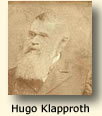 In
1867,
In
1867,  At
that time a scholarly historian in Germany, Johannes Janssen, a Jesuit priest,
had written a four-volume work on the history of the Reformation and its
disastrous effects on the Church in Germany. It naturally dealt in great detail
with Luther himself, a heretic and apostate priest. The work’s influence was
being felt in many quarters, and the Lutheran establishment was anxious to
disprove the accusations leveled against Luther therein. The man they felt most
qualified to refute the scholarly work was Hugo Klapproth. When asked to accept
the challenge, Mr. Klapproth gladly accepted.
At
that time a scholarly historian in Germany, Johannes Janssen, a Jesuit priest,
had written a four-volume work on the history of the Reformation and its
disastrous effects on the Church in Germany. It naturally dealt in great detail
with Luther himself, a heretic and apostate priest. The work’s influence was
being felt in many quarters, and the Lutheran establishment was anxious to
disprove the accusations leveled against Luther therein. The man they felt most
qualified to refute the scholarly work was Hugo Klapproth. When asked to accept
the challenge, Mr. Klapproth gladly accepted. 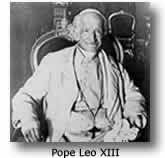 Klapproth
moved to St. Paul and took over as editor of that publication. This was at the
time when the heresy of Americanism was taking root under the tutelage of the
likes of Archbishop John Ireland. It would become so rampant in the United
States soon thereafter, in fact, that, in 1899, Pope Leo XIII promulgated his
monumental encyclical against it,
Klapproth
moved to St. Paul and took over as editor of that publication. This was at the
time when the heresy of Americanism was taking root under the tutelage of the
likes of Archbishop John Ireland. It would become so rampant in the United
States soon thereafter, in fact, that, in 1899, Pope Leo XIII promulgated his
monumental encyclical against it,
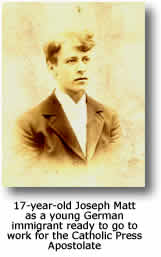 On
arriving in America in 1895, with very little money and a great desire to write,
he earned a scholarship to Canisius College. After his graduation, he took a job
as a reporter for several German Catholic daily newspapers, first in Buffalo,
New York, and later in Pittsburgh. He quickly distinguished himself as a
no-nonsense journalist. He entitled his column “Spruhfeuer”, in fact, which
loosely translates as “let the sparks fly where they will.”
On
arriving in America in 1895, with very little money and a great desire to write,
he earned a scholarship to Canisius College. After his graduation, he took a job
as a reporter for several German Catholic daily newspapers, first in Buffalo,
New York, and later in Pittsburgh. He quickly distinguished himself as a
no-nonsense journalist. He entitled his column “Spruhfeuer”, in fact, which
loosely translates as “let the sparks fly where they will.”
 During
these 65 years Joseph Matt dealt with many issues of import, not only in the
Church but also in politics and the world at large. Because he spoke six
languages fluently, his coverage of world news was an exceptionally
well-informed and sought after feature of
During
these 65 years Joseph Matt dealt with many issues of import, not only in the
Church but also in politics and the world at large. Because he spoke six
languages fluently, his coverage of world news was an exceptionally
well-informed and sought after feature of  “What
Mr. Welles claims about
“What
Mr. Welles claims about  Joseph
Matt served in many organizations, such as the Catholic Central Verein and the
Catholic Aide Society. Joseph Matt and the Central Verein’s Dr. F. P. Kenkel
became the authorities on the question of how, since the middle 19th Century,
German-Americans had battled, especially through the Central Verein, to stomp
out Freemasonry’s influence in the United States.
Joseph
Matt served in many organizations, such as the Catholic Central Verein and the
Catholic Aide Society. Joseph Matt and the Central Verein’s Dr. F. P. Kenkel
became the authorities on the question of how, since the middle 19th Century,
German-Americans had battled, especially through the Central Verein, to stomp
out Freemasonry’s influence in the United States. 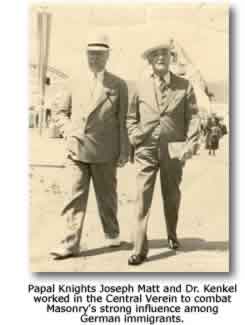 His
long career was coming to a close at the time of the Second Vatican Council.
Mercifully, God took this loyal son to Himself before the horrors of Vatican II
had manifested themselves throughout the world. One who had so loyally and
competently served the Church and the great pre-Vatican II popes for close to 70
years could not easily have watched Modernism run roughshod over the Church from
within.
His
long career was coming to a close at the time of the Second Vatican Council.
Mercifully, God took this loyal son to Himself before the horrors of Vatican II
had manifested themselves throughout the world. One who had so loyally and
competently served the Church and the great pre-Vatican II popes for close to 70
years could not easily have watched Modernism run roughshod over the Church from
within.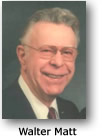
 Walter
Matt’s strong stand against the New Mass was shared but not by many. Men such as
Dietrich von Hildebrand quickly allied themselves with Walter Matt and his
fledgling Remnant as they all sought to establish a Catholic counterrevolution.
Walter
Matt’s strong stand against the New Mass was shared but not by many. Men such as
Dietrich von Hildebrand quickly allied themselves with Walter Matt and his
fledgling Remnant as they all sought to establish a Catholic counterrevolution.  Dear
Mr. Alphonse Matt:
Dear
Mr. Alphonse Matt: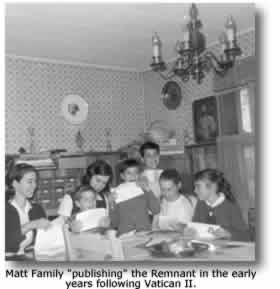 Such
was the legacy of the Revolution of Vatican II…good men were pitted against each
other because of it, and confusion reigned. And, in such a climate, Walter Matt
went to work for the Catholic restoration through his Remnant. For the first few
years, before
Such
was the legacy of the Revolution of Vatican II…good men were pitted against each
other because of it, and confusion reigned. And, in such a climate, Walter Matt
went to work for the Catholic restoration through his Remnant. For the first few
years, before 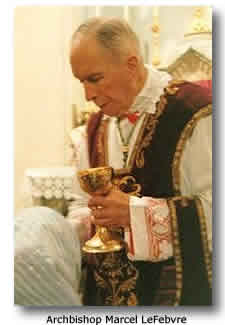 In
1976, Walter Matt received a letter from a certain French archbishop who was
making headlines throughout the world for standing against the Council and the
New Mass. The archbishop asked to publicly meet with
In
1976, Walter Matt received a letter from a certain French archbishop who was
making headlines throughout the world for standing against the Council and the
New Mass. The archbishop asked to publicly meet with
 The
precedent had been set, and the so-called “schism” of Archbishop Lefebvre had
been tossed on its head.
The
precedent had been set, and the so-called “schism” of Archbishop Lefebvre had
been tossed on its head. 
 Through
the combined efforts of so many traditionalist magazines, priestly fraternities,
publishers, and individuals, the worldwide traditional Catholic movement was on
the move, and pioneers such as Walter Matt were no longer alone.
Through
the combined efforts of so many traditionalist magazines, priestly fraternities,
publishers, and individuals, the worldwide traditional Catholic movement was on
the move, and pioneers such as Walter Matt were no longer alone.
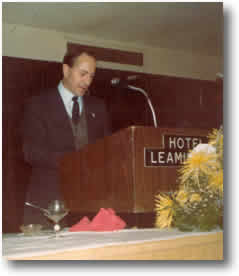 Never
falling victim to the so-called “Indult Mentality”, however, whereby traditional
Catholics are expected to succumb to quietism in exchange for permission to have
the old Mass (the so-called “Indult Mass”) Walter Matt refused to, as Abbé de
Nantes had put it, “swallow the Council in exchange for the Mass.”
Never
falling victim to the so-called “Indult Mentality”, however, whereby traditional
Catholics are expected to succumb to quietism in exchange for permission to have
the old Mass (the so-called “Indult Mass”) Walter Matt refused to, as Abbé de
Nantes had put it, “swallow the Council in exchange for the Mass.”  Shortly
after the promulgation of the motu proprio Ecclesia Dei, through which the
Traditional Latin Mass was restored, the late great Fr. Vincent Miceli called
Mr. Matt a “titan of the Church”:
Shortly
after the promulgation of the motu proprio Ecclesia Dei, through which the
Traditional Latin Mass was restored, the late great Fr. Vincent Miceli called
Mr. Matt a “titan of the Church”: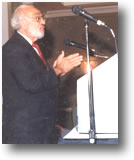 "When
all other Catholic voices were silent, at least in the world of journalism,
Walter Matt was there, defending Catholic tradition. I never thought I’d be
speaking approvingly of—dare I say the phrase?—“the winds of change,” but aren’t
the winds of change beginning to move through the Church? Ain't it nice to have
the Old Mass back—or at least, on the way back? Thank you, Walter, from the
bottom of my heart, for helping make this possible."
"When
all other Catholic voices were silent, at least in the world of journalism,
Walter Matt was there, defending Catholic tradition. I never thought I’d be
speaking approvingly of—dare I say the phrase?—“the winds of change,” but aren’t
the winds of change beginning to move through the Church? Ain't it nice to have
the Old Mass back—or at least, on the way back? Thank you, Walter, from the
bottom of my heart, for helping make this possible."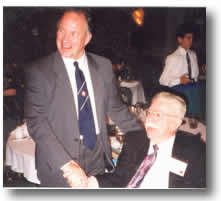 In
a letter dated April 27, 2002, Mr. Davies writes: "Walter’s entire life as a
journalist was a fight, a fight for authentic Catholicism, above all in the
disastrous period following Vatican II. The fact that there is now an effective
resistance to the omni-present neo-Modernism throughout the English-speaking
world is, I would say, due more to him than to any other individual with the
possible exception of his friend Hamish Fraser. The fact that I was, in my own
small way, able to assist these two great men in the fight for the truth gives
me more satisfaction than any other aspect of my life."
In
a letter dated April 27, 2002, Mr. Davies writes: "Walter’s entire life as a
journalist was a fight, a fight for authentic Catholicism, above all in the
disastrous period following Vatican II. The fact that there is now an effective
resistance to the omni-present neo-Modernism throughout the English-speaking
world is, I would say, due more to him than to any other individual with the
possible exception of his friend Hamish Fraser. The fact that I was, in my own
small way, able to assist these two great men in the fight for the truth gives
me more satisfaction than any other aspect of my life."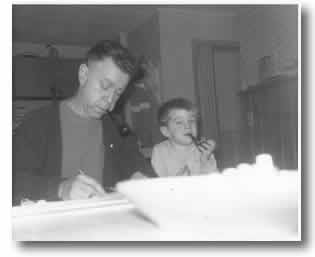 Today
Michael Matt carries on the journalistic tradition of the Matt Family, handed
down to him by his great-grandfather, grandfather and father. The Catholic Press
Apostolate’s battle against the world, the flesh and the Devil, in the name of
Catholic truth and tradition, continues....
Today
Michael Matt carries on the journalistic tradition of the Matt Family, handed
down to him by his great-grandfather, grandfather and father. The Catholic Press
Apostolate’s battle against the world, the flesh and the Devil, in the name of
Catholic truth and tradition, continues....